Munich’s public walking tour offers visitors a captivating opportunity to explore the city’s rich history and cultural heritage. From the passionate love story between King Ludwig I and Lola Montez to the pivotal role Munich played in the rise of the Nazi party, the tour delves into the diverse narratives that have shaped this vibrant center of commerce, scholarship, and the arts. Tracing the city’s origins as a medieval salt trading post, the tour also highlights the profound influence of beer on Munich’s architecture, social fabric, and overall development. With engaging storytelling and a focus on intriguing historical figures, this multifaceted journey promises to leave participants eager to uncover more of Munich’s captivating past.
Key Points
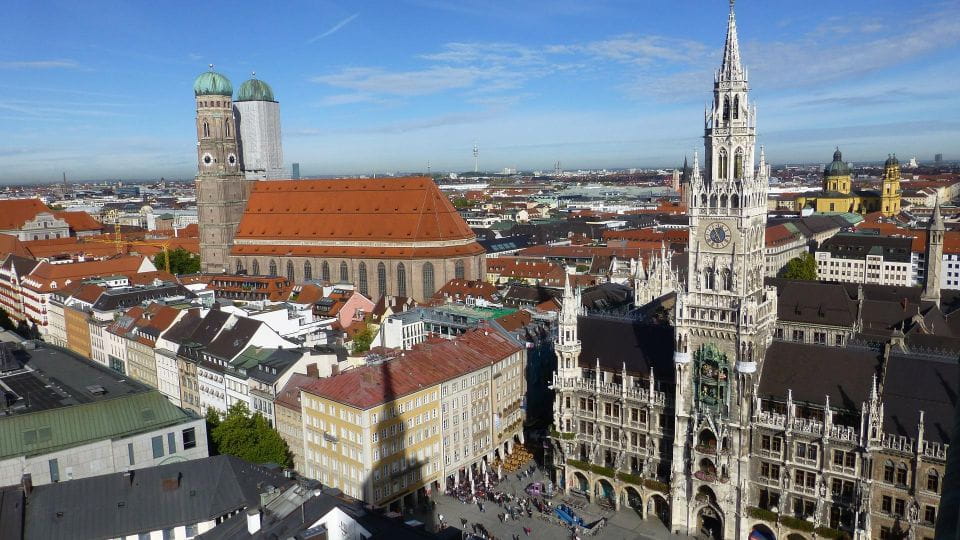
- Explore the city’s medieval origins, from its hotel as a salt trading post to the construction of the first city walls in 1285.
- Discover the lasting impact of the Wittelsbach dynasty, who shaped Munich’s cultural and architectural heritage as the capital of the Kingdom of Bavaria.
- Uncover the city’s pivotal role in the rise of the Nazi party, including the failed 1923 Beer Hall Putsch and the Degenerate Art exhibition.
- Gain insights into the influential love story between King Ludwig I and the Spanish dancer Lola Montez, which led to the king’s abdication in 1848.
- Experience Munich’s vibrant beer culture, from the prominence of local breweries to the iconic beer halls and gardens that have defined the city’s social and architectural landscape.
Love Story of King Ludwig I and Lola Montez
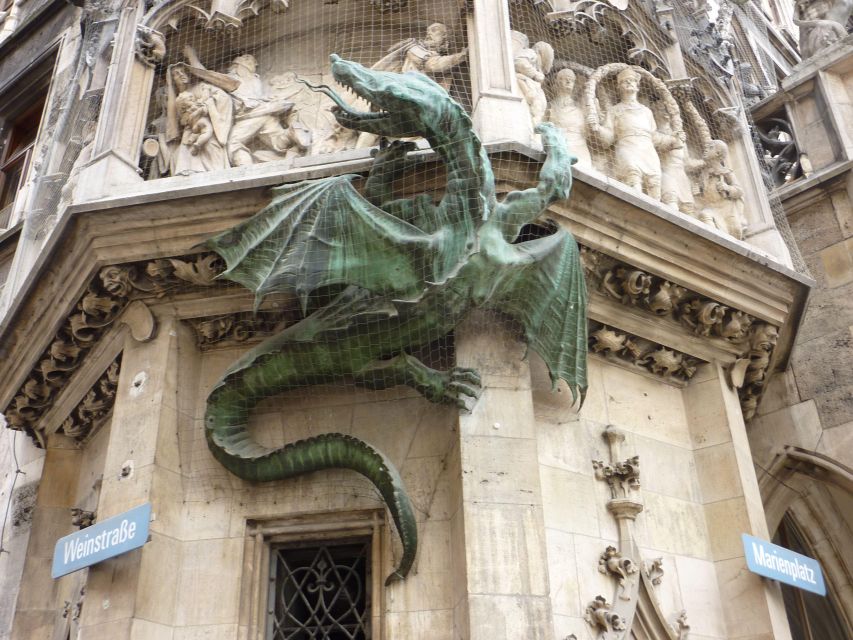
During the tour, visitors will learn about the passionate love story between King Ludwig I of Bavaria and the Spanish dancer Lola Montez.
In the 1840s, the king became infatuated with the enchanting Lola, who was known for her exotic beauty and scandalous performances. Their relationship caused a public uproar, leading to Ludwig’s abdication in 1848.
Lola’s influence over the king was significant, as she managed to secure noble titles and privileges for herself. The tour delves into the intriguing details of this controversial romance, shedding light on how it shaped the political and social landscape of Munich during that turbulent period.
If you're enjoying exploring Munich on foot, you'll love these other walking tours we recommend
Munich’s Role in the Third Reich
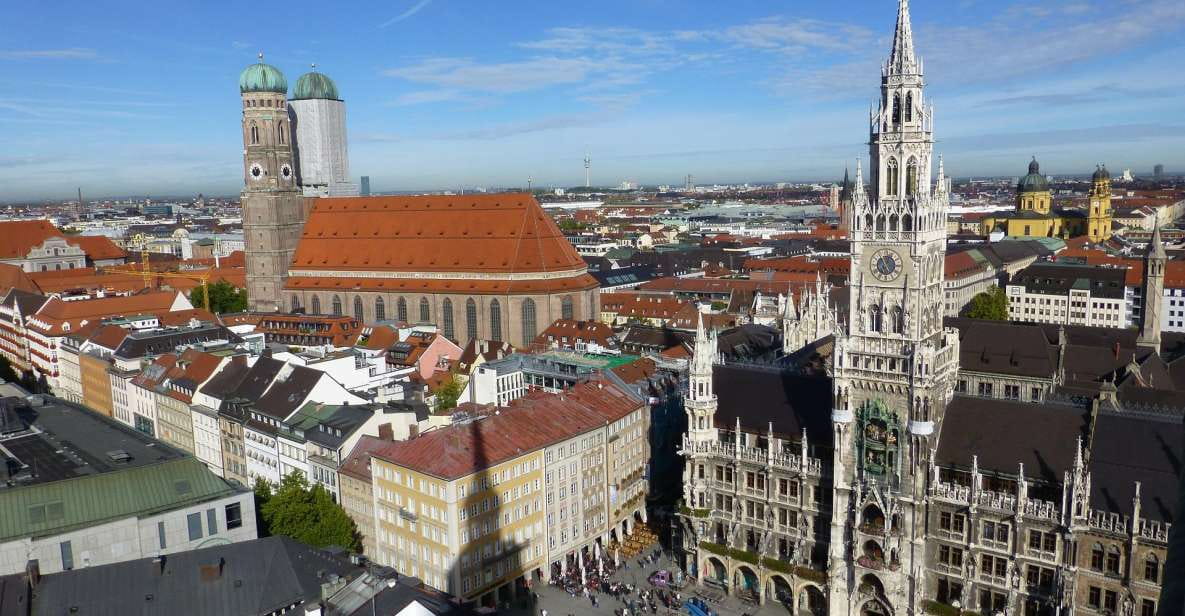
Munich played a pivotal role in the rise of the Third Reich. The city served as an early stronghold for the Nazi party, with Adolf Hitler and other prominent figures establishing their headquarters there in the 1920s. Key events like the failed 1923 Beer Hall Putsch and the infamous Nuremberg Rallies cemented Munich’s status as a symbolic center of Nazi power. The city’s close ties to the Nazi movement are evident in the following timeline:
| Year | Event |
|---|---|
| 1920 | Hitler gives his first speech in Munich as leader of the Nazi party |
| 1923 | The failed Beer Hall Putsch takes place in Munich |
| 1933 | The Nazi party holds its first Reichsparteitag (Reich Party Congress) in Munich |
| 1937 | The Degenerate Art exhibition opens in Munich, targeting modern art |
Origins of Munich and Bavaria
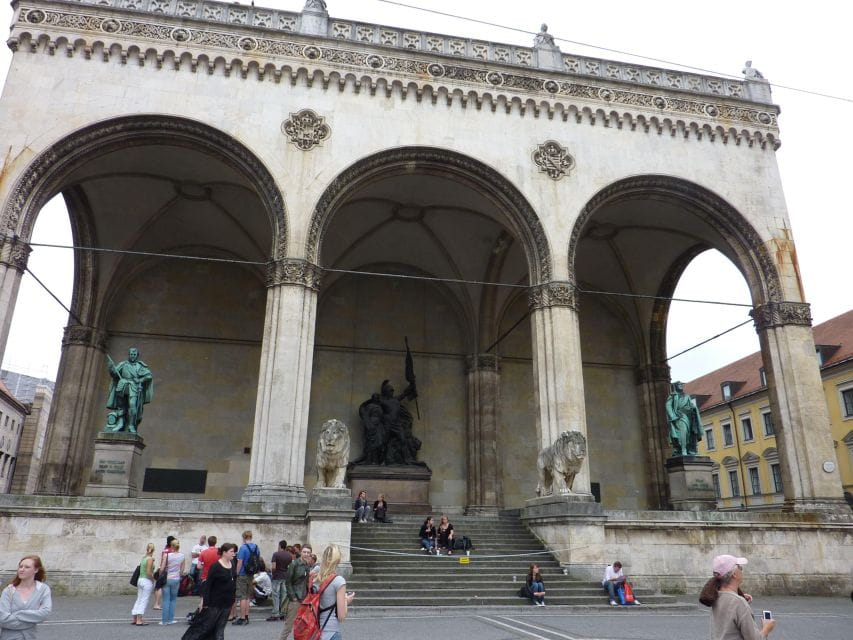
Founded in 1158, the city of Munich traces its origins to a medieval salt trading post along the banks of the Isar River.
As the seat of the Wittelsbach dynasty, it would eventually become the capital of the Kingdom of Bavaria, playing a pivotal role in shaping the region’s rich cultural heritage.
Over the centuries, Munich grew from a small market town into a vibrant center of commerce, scholarship, and the arts. The city’s strategic location and the patronage of its rulers allowed it to flourish, with the construction of grand palaces, churches, and public spaces that continue to captivate visitors today.
Munich’s unique blend of tradition and modernity reflects the enduring legacy of its storied past.
Beer’s Influence on City History
How integral has beer been to Munich’s growth and development over the centuries? As the production and consumption of beer became deeply rooted in the city’s culture, it profoundly shaped Munich’s economic, social, and architectural landscape.
Beer’s economic impact: The rise of prominent breweries like Augustiner, Hofbräuhaus, and Paulaner fueled the local economy and employment.
Beer halls as hubs of civic engagement: Beer halls emerged as spaces for political discourse, social interaction, and community building.
Beer’s architectural influence: The construction of sprawling beer gardens and palatial breweries helped shape Munich’s distinctive architectural identity.
Oktoberfest and Munich’s beer culture: Today, Munich’s beer culture remains a defining feature, attracting millions of visitors annually to iconic events like Oktoberfest.
Events Leading to Munich’s Founding
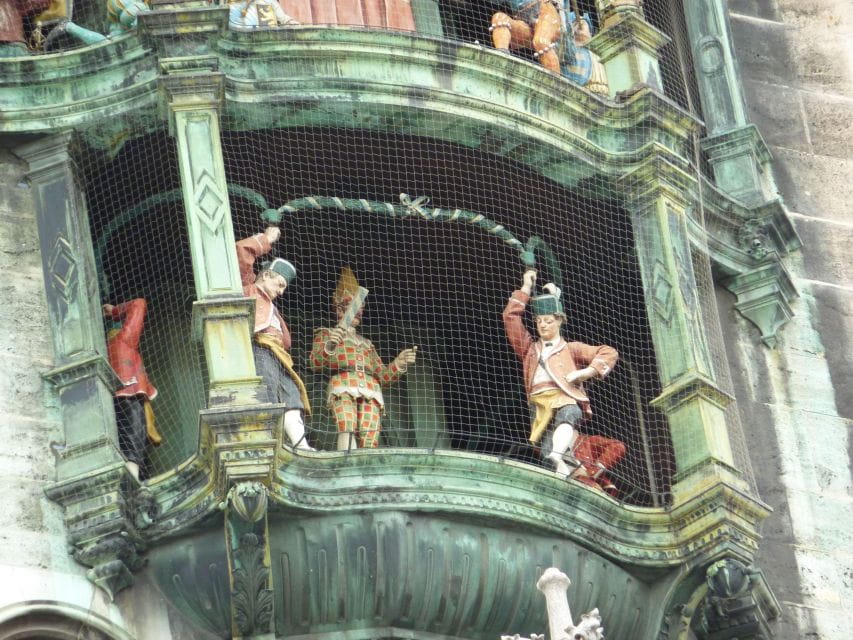
While Munich’s beer culture has undoubtedly left an indelible mark on the city, its origins can be traced back to a series of pivotal events that led to its founding centuries ago. In the late 12th century, the Duke of Bavaria, Henry the Lion, established a settlement on the banks of the Isar River, which would eventually become the city of Munich. This strategic location, along with the region’s fertile land and access to important trade routes, contributed to the city’s rapid growth and development. The following table outlines some of the key events and figures that shaped the founding and early history of Munich:
| Event | Year |
|---|---|
| Establishment of the settlement by Henry the Lion | 1158 |
| Munich receives city rights and granted a mint | 1175 |
| Wittelsbach dynasty takes control of the Duchy of Bavaria | 1180 |
| Construction of the first city walls begins | 1285 |
- Neuschwanstein Castle and Linderhof VIP All-Inc Tour From Munich
- Munich Old Town Walking Tour
- Neuschwanstein Castle and Linderhof Palace Day Trip From Munich
- Classic Munich Bike Tour With Beer Garden Stop
- Guided Dachau Concentration Camp Memorial Site Tour With Train From Munich
- Dachau Concentration Camp Memorial Tour With Train From Munich
Passionate Storytelling of Hidden Tales
The public walking tour delves into Munich’s captivating past, unearthing its hidden tales and lesser-known stories that have shaped the city’s rich history. Led by passionate guides, the tour brings to life the fascinating connections between key figures, events, and the evolution of the city.
Participants will discover:
The scandalous love story between King Ludwig I and the enigmatic Lola Montez, which shook the foundations of the Bavarian monarchy.
The city’s complex role in the rise of the Third Reich and its links to the infamous Adolf Hitler.
The origins of Munich’s enduring beer culture and how it has influenced the city’s development.
Intriguing insights into the founding of the Kingdom of Bavaria and the events that led to the hotel of the city.
Exploring Intriguing Historical Figures
Throughout the tour, participants explore the lives of intriguing historical figures who’ve left an indelible mark on Munich’s past. Foremost among them is the captivating story of King Ludwig I and his scandalous relationship with the enigmatic Lola Montez, which sent shockwaves through the Bavarian monarchy.
The tour also explores the connections between Munich and the rise of the Third Reich, uncovering the city’s role in the early days of the Nazi movement and the influence of figures like Adolf Hitler.
Plus, guests learn about the origins of the Kingdom of Bavaria and its enduring impact on the city’s cultural and political identity.
Uncovering Fascinating City Connections
Alongside the captivating tales of historical figures, the tour delves into Munich’s intricate connections to the broader currents of history and culture. Participants uncover the city’s deep-rooted ties to the rise of the Bavarian monarchy and its lasting influence on the region’s identity.
On top of that, they explore the fascinating links between Munich’s history and the evolution of Germany’s beer culture, uncovering how the city’s brewing traditions have been intertwined with its social and economic development over the centuries.
The tour highlights four key connections:
- The symbiotic relationship between Munich and the Bavarian royal family.
- The city’s pivotal role in the growth of Germany’s beer industry.
- The echoes of Munich’s past in the present-day urban landscape.
- The city’s complex legacy in the context of 20th-century German history.
Frequently Asked Questions
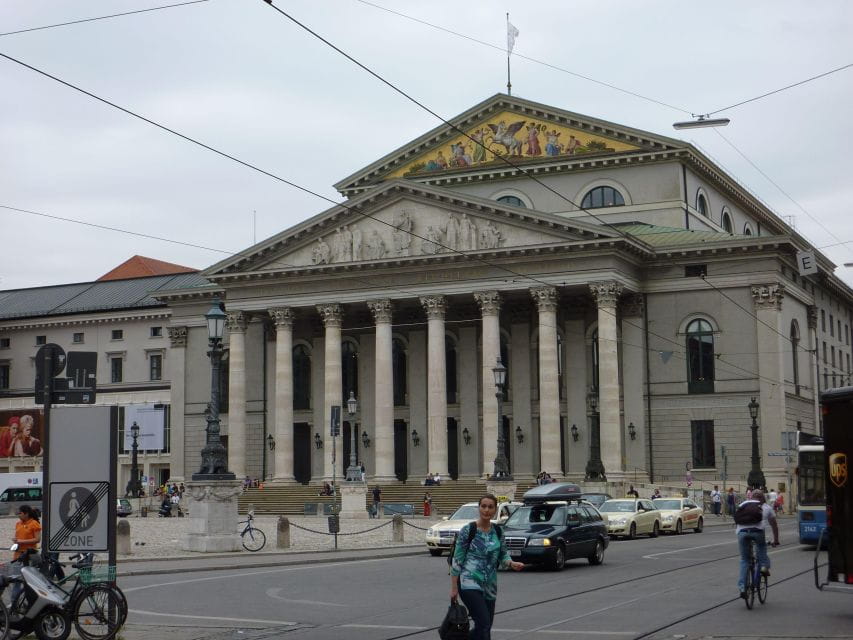
Can I Join the Tour With Children?
Yes, children are welcome to join the tour. The tour is suitable for all ages and families, though the content may not be suitable for very young children.
Are There Any Discounts for Students or Seniors?
Yes, the tour offers discounts for students and seniors. Specifically, students and seniors receive a 10% discount off the standard tour price. Visitors should inquire about eligibility requirements when booking the tour.
How Much Walking Is Involved in the Tour?
The walking tour involves approximately 2 hours of moderate walking through the city streets and historic sites. Participants can expect to cover several kilometers during the tour and should wear comfortable shoes.
Is the Tour Wheelchair Accessible?
The tour is generally accessible for wheelchair users, with level paths and the ability to accommodate mobility needs. However, it’s recommended to check with the tour operator in advance to confirm accessibility arrangements.
Can I Bring My Own Food and Drinks on the Tour?
Participants are generally allowed to bring their own food and drinks on the tour. However, it’s best to check with the tour organizer beforehand as policies may vary. Consuming food and drinks during the tour is at the discretion of the guide.
Recap
The Munich public walking tour offers a captivating exploration of the city’s rich history and cultural heritage.
Visitors can explore the passionate love story between King Ludwig I and Lola Montez, uncover Munich’s pivotal role in the Nazi party’s rise, and trace the city’s origins from a medieval trading post to a vibrant center of commerce and the arts.
This multifaceted journey provides a compelling glimpse into the diverse narratives that have shaped the captivating city of Munich.
More Walking Tours in Munich
- Munich Private Guided Walking Tour with Deutsche Museum
- Munich: Walking tour of the old town with all your senses
- Munich: Private Walking Tour Through Munichs Heart
- Munich: Private Walking Tour with good laughs and much info
- Munich: City Highlights and Beer Garden Walking Tour
- Private Munich Old Town and Historical City Walking Tour
More Tours in Munich
- Munich: Mini Classic Bike Tour with Beer Garden Stop at 4 PM
- National Socialism WWII with licensed guide – private tour
- Munich: Dachau Concentration Camp Private Tour by Car
- Munich: Residenz Museum Tickets and 2,5-hour Guided Tour
- Munich and Nazi History Combination Day Tour Small Group
- Private Munich Bike Tour with Beer Garden Lunch Break
More Tour Reviews in Munich
- Munich: Raven Black Witches and Executioners Walking Tour
- Munich: Night PubCrawl Shots and Party!
- Munich: Phototour – Your guide to beautiful photo spots
- Munich: Private or Group Third Reich and WWII Walking Tour
- Munich: Classic Guided City Tour by Bike (English Tour Only)
- Oktoberfest Tour: All in!!! Table reservation with 2 tickets for rides
Not for you? Here's more things to do in Munich we have recnetly reviewed
- Munich: Old Town Highlights Private City Tour – Walking Tour
- Munich Residenz: Master Concert in the Hercules Hall
- Munich: Private Walking Tour Munich Highlights
- Munich: River Surfing in MunichSurfing all you need to know
- Munich: Adventurous Bachelor Party Surf Experience – Munich
- Munich: Private Tour with a Local Guide
- Munich: Highlights Walking Tour with a Guide
- Munich Specials (choose!): OldTown, Dachau, 10Tastes, Spooky
- Munich: Wheelchair Rickshaw Tour through the English Garden
- Third Reich: Art, Cult and Ideology behind the tragedy
- Munich: Private Highlights Tour by Car – Private Tour Guide
- Secret Food Tours Munich
